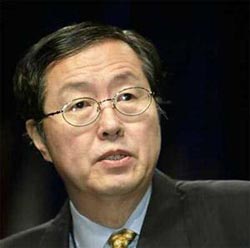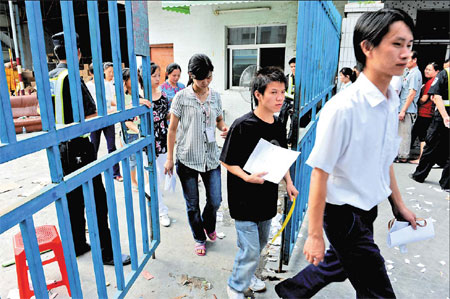The Dubai Financial Market General Index slumped 5.9 percent to 2,631.46, the lowest since February 2005. The Abu Dhabi Securities Exchange General Index fell 4 percent, while the Kuwait Stock Exchange Index declined 2.8 percent after oil slid below $60 a barrel last week.
``Falling oil prices are eroding market confidence,'' Ali Khan, head of equity trading at Dubai's Arqaam Capital Ltd., said in a phone interview. ``As oil starts to test $60 or $50 a barrel, it becomes an issue here.''
Stock indexes in Dubai and Saudi Arabia lost about half of their value this year on concern a 36 percent slide in oil, $689 billion in global bank losses from the credit crises and a U.S. economic contraction will slow growth in the Middle East.
Emaar Properties has retreated 70 percent in 2008, while Dubai Islamic Bank PJSC, the U.A.E.'s biggest lender complying with Muslim banking rules, slumped 62 percent.
Oil, Economic Forecasts
The six Gulf Arab states, including Saudi Arabia, the United Arab Emirates and Kuwait, pump almost 20 percent of the world's daily oil supply. Crude has dropped 59 percent from the record $147.27 in July on signs the contracting U.S. economy is cutting fuel use in the biggest energy-consuming country.
EFG-Hermes, the largest Arab investment bank by market value, cited plunging oil in a report received by e-mail today in which it reduced the 2009 economic growth forecast for the United Arab Emirates to 4.8 percent from 7 percent. The bank cut the estimate for Saudi Arabia to 2.4 percent from 4.5 percent.
U.S. Recession
U.S. President-elect Barack Obama will inherit the worst recession since Ronald Reagan's second year in the White House, economists said as figures showed last week that U.S. payrolls plunged by more than half a million the past two months. The world's largest economy will shrink at a 3.5 percent annual rate in the fourth quarter, according to Goldman Sachs Group Inc.
``The liquidity crunch is affecting every sector in the market,'' said Faisal Hasan, head of research at Global Investment House KSCC, which has $9.4 billion in assets under management. ``Investors are sitting on the sidelines with cash. Falling oil prices and news on Emaar are certainly not helping.''
Emaar fell 9.9 percent to 4.44 dirhams, the lowest since November 2004. The developer will allow real-estate customers to defer payments because the credit crisis has made it more difficult for buyers to get loans from banks, Gulf News reported, citing Eisam Galadari, chief executive officer of Emaar's international operations.
Aldar Properties dropped 7.8 percent to 4.96 dirhams, while Sorouh Real Estate Co., the emirate's second-largest developer by market value, fell 8.3 percent to 3.55 dirhams.
Steel Prices
Industries Qatar lost 7.7 percent to 102.5 riyals. Qatar Steel, a unit of the largest publicly traded company in the Gulf emirate, said it's lowering steel prices to match the drop in international prices, without disclosing the size of the cut.
The new retail price for 10-40 millimeter steel will range from 2,400 riyals ($659) to 2,460 riyals, the company said in a statement posted on the Doha bourse.
Saudi Arabia's Tadawul All Share Index added 1.4 percent today after falling 5.8 percent yesterday. Oman's Muscat Securities Market 30 Index lost 2.6 percent, while in Qatar the DSM 20 Index retreated 5.2 percent. The Bahrain All Share Index fell 1.7 percent.
Today's decline left Dubai's benchmark index valued at 6.2 times the earnings of its 29 companies, the lowest level since at least February 2007, data compiled by Bloomberg show. Abu Dhabi's index trades at 7.9 times profit. The MSCI Emerging Markets Index is valued at 8.3 times earnings.
The following stocks also rose or fell in the region. Stock symbols are in parentheses after company names:
Al Themar International Holding (THEMAR KK) dropped 3.5 percent to 112 fills. The Kuwaiti property-trading company said third-quarter profit fell to 1 million dinars from 1.9 million in the year-earlier period.
Kuwait Hotels Co. (KHOT KK) slid 1.1 percent to 188 fils. The hotel operator and developer said third-quarter profit declined to 134,377 dinars from 417,081 dinars in the year- earlier period.
National Central Cooling Co. (TABREED UH) declined 4.7 percent to 1.01 dirham. The air-conditioning company known as Tabreed was cut to ``equal weight'' from ``overweight'' at Morgan Stanley.
Qatar Telecom QSC (QTEL QD) fell 3.5 percent to 139.3 riyals. The provider of phone services in 16 countries views its revised offer to buy a 24.2 percent stake in Indonesia's PT Indosat at 6,416 rupiah a share as still being fair, Bisnis Indonesia reported. Indonesia's capital markets regulator said Qatar Telecom should stick to its original offer price to raise its holding in Indonesia's second-largest telephone company.
To contact the reporter on this story: Haris Anwar in Dubai on Hanwar2@bloomberg.net













